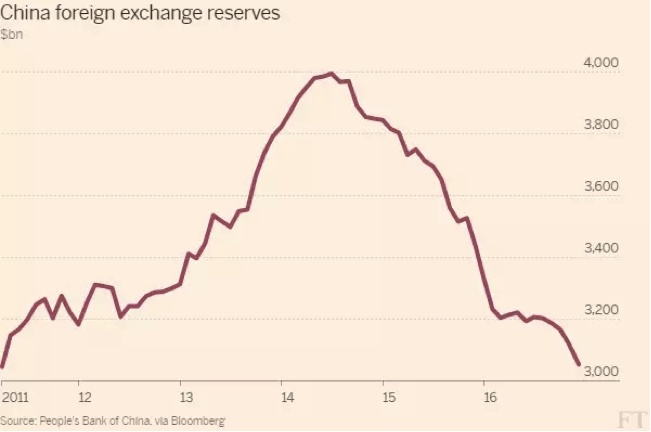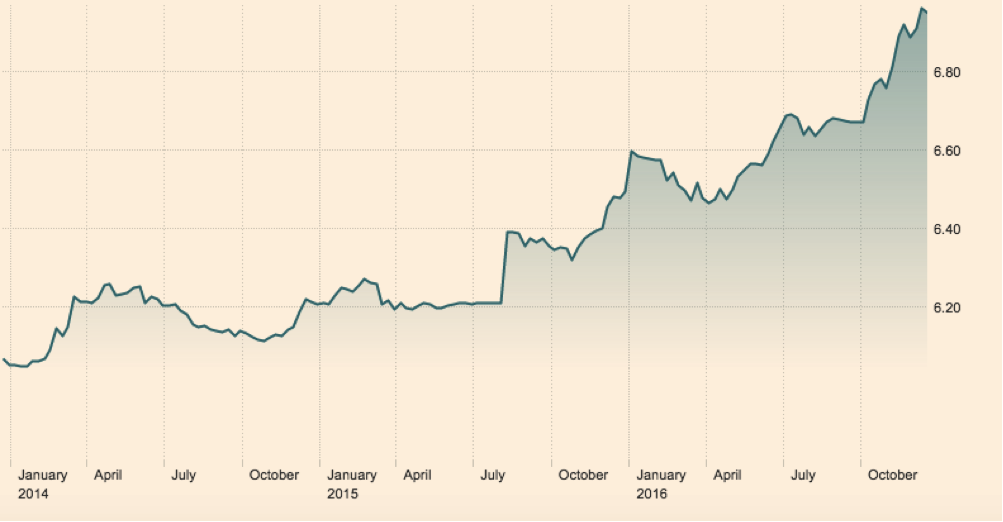Chinese foreign currency reserves are falling. The decrease of $70 billions in November was the highest since January and has brought reserves to the $3 trillion threshold, 25% down from the 2014 level when they were $4 trillions.
The decrease in reserves is caused mainly by three factors: the depreciation of the Renminbi, the following Capital outflow and the most recent appreciation of the US Dollar.
During the month of August of 2015, a devaluation of the Chinese currency started a period in which, over just a year and a half, the US Dollar went from around 6.20 Renminbi to almost 7. This devaluation and the following depreciation, caused and was amplified by the capital outflows from China. In the first ten month of 2016 they amounted to $530 billions.
At the same time the rally of the US dollar following the elections and the most recent FED’s decisions are appreciating the American currency decreasing the value in terms of US Dollars of Chinese reserves. Chinese leaders are trying to reduce the effects on their currency by selling reserves while buying Renminbi. However, this policy’s effects are causing some worries among the leaders of the communist party.
In particular, there are two numbers that Chinese leaders care a lot about: 7 and 3. Those are not lucky number; they represent two limits that should be respected. The first one is the exchange rate with the US dollar: the greenback should never be worth more than 7 Renminbi. On the other hand, 3 represents the minimum amount in trillions of dollars of foreign currency that should be held by the People’s Bank of China according to the leaders.
However, those two limits give rise to a dilemma: keeping reserves at 3 trillions implies not intervening in the foreign exchange market and therefore letting the Renminbi depreciate; on the other side, controlling the domestic currency will imply selling foreign currency and giving up the 3 trillions limit. Most recent data show that the exchange rate is approaching 7 and that in November foreign currency reserves have reached the level of $3.051 trillion.
The decrease in reserves is caused mainly by three factors: the depreciation of the Renminbi, the following Capital outflow and the most recent appreciation of the US Dollar.
During the month of August of 2015, a devaluation of the Chinese currency started a period in which, over just a year and a half, the US Dollar went from around 6.20 Renminbi to almost 7. This devaluation and the following depreciation, caused and was amplified by the capital outflows from China. In the first ten month of 2016 they amounted to $530 billions.
At the same time the rally of the US dollar following the elections and the most recent FED’s decisions are appreciating the American currency decreasing the value in terms of US Dollars of Chinese reserves. Chinese leaders are trying to reduce the effects on their currency by selling reserves while buying Renminbi. However, this policy’s effects are causing some worries among the leaders of the communist party.
In particular, there are two numbers that Chinese leaders care a lot about: 7 and 3. Those are not lucky number; they represent two limits that should be respected. The first one is the exchange rate with the US dollar: the greenback should never be worth more than 7 Renminbi. On the other hand, 3 represents the minimum amount in trillions of dollars of foreign currency that should be held by the People’s Bank of China according to the leaders.
However, those two limits give rise to a dilemma: keeping reserves at 3 trillions implies not intervening in the foreign exchange market and therefore letting the Renminbi depreciate; on the other side, controlling the domestic currency will imply selling foreign currency and giving up the 3 trillions limit. Most recent data show that the exchange rate is approaching 7 and that in November foreign currency reserves have reached the level of $3.051 trillion.
The dilemma gave rise to two different ways to solve it: the one supported by the mercantilist leadership of the Communist party and the other supported by economically literate officials. The first way of thinking sees in the amount of foreign reserve a strength and a source of prestige for the country. Therefore, their main concern is on the number 3: at least 3 trillion dollar worth of foreign currencies should be kept disregarding the foreign exchange limit of 7 Renminbi per dollar, letting therefore the currency depreciate.
On the other side, officials believe that depreciation of the Renminbi is a more important issue than the prestige and strength of the country. They would in fact sell foreign currency reserves as long as they can in order to mitigate the depreciation pressure on the Chinese currency.
In fact, according to the IMF the amount of foreign reserves that a country should keep has to be equal to the total amount needed to pay for imports in the following 3 months and all the money needed to repay foreign loans. For China, this requirement would be between 1 and 2 trillions giving therefore a 1 trillion room for People’s Bank of China’s intervention in foreign exchange markets.
The decision regarding which route would be the best for China is crucial as there is more at stake than just the exchange rate; the commercial relationship with the United States of America is in fact in danger.
President elected Donald Trump believes that China has been depreciating its currency on purpose in order to increase exports over the last few years. Therefore, if the side backed by the leadership of the party is implemented, it might look like a strategy to further depreciate Renminbi and this could lead to a commercial war with the US.
Matteo Laurora
On the other side, officials believe that depreciation of the Renminbi is a more important issue than the prestige and strength of the country. They would in fact sell foreign currency reserves as long as they can in order to mitigate the depreciation pressure on the Chinese currency.
In fact, according to the IMF the amount of foreign reserves that a country should keep has to be equal to the total amount needed to pay for imports in the following 3 months and all the money needed to repay foreign loans. For China, this requirement would be between 1 and 2 trillions giving therefore a 1 trillion room for People’s Bank of China’s intervention in foreign exchange markets.
The decision regarding which route would be the best for China is crucial as there is more at stake than just the exchange rate; the commercial relationship with the United States of America is in fact in danger.
President elected Donald Trump believes that China has been depreciating its currency on purpose in order to increase exports over the last few years. Therefore, if the side backed by the leadership of the party is implemented, it might look like a strategy to further depreciate Renminbi and this could lead to a commercial war with the US.
Matteo Laurora

